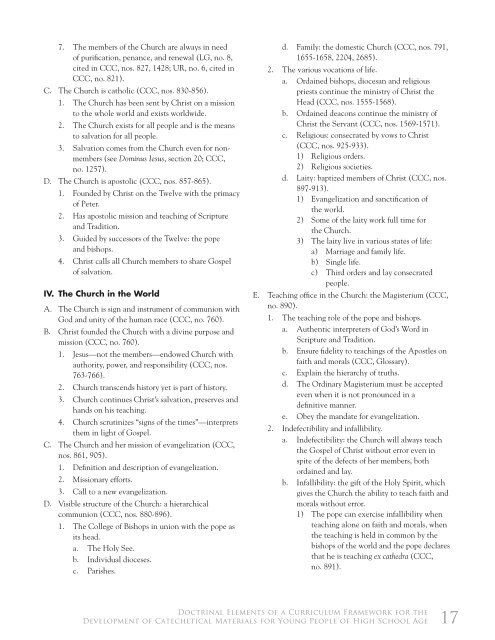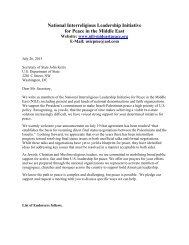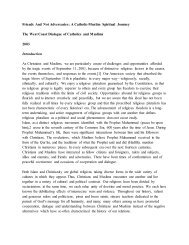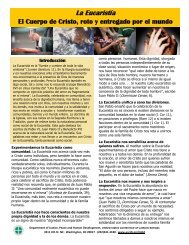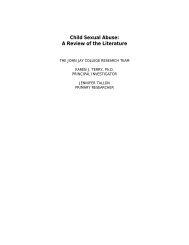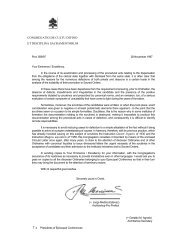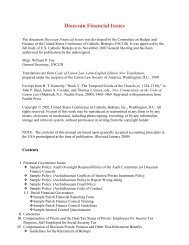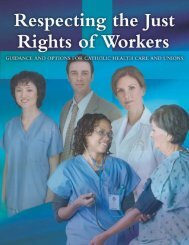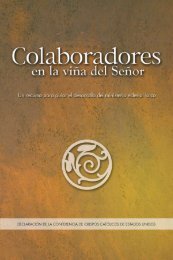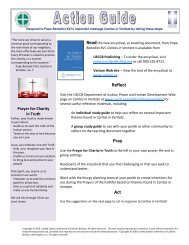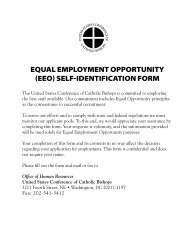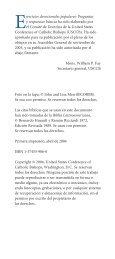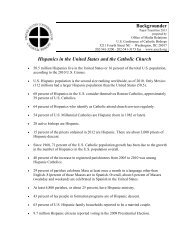7. The members <strong>of</strong> <strong>the</strong> Church are always in need<strong>of</strong> purification, penance, and renewal (LG, no. 8,cited in CCC, nos. 827, 1428; UR, no. 6, cited inCCC, no. 821).C. The Church is catholic (CCC, nos. 830-856).1. The Church has been sent by Christ on a missionto <strong>the</strong> whole world and exists worldwide.2. The Church exists <strong>for</strong> all people and is <strong>the</strong> meansto salvation <strong>for</strong> all people.3. Salvation comes from <strong>the</strong> Church even <strong>for</strong> nonmembers(see Dominus Iesus, section 20; CCC,no. 1257).D. The Church is apostolic (CCC, nos. 857-865).1. Founded by Christ on <strong>the</strong> Twelve with <strong>the</strong> primacy<strong>of</strong> Peter.2. Has apostolic mission and teaching <strong>of</strong> Scriptureand Tradition.3. Guided by successors <strong>of</strong> <strong>the</strong> Twelve: <strong>the</strong> popeand bishops.4. Christ calls all Church members to share Gospel<strong>of</strong> salvation.IV. The Church in <strong>the</strong> WorldA. The Church is sign and instrument <strong>of</strong> communion withGod and unity <strong>of</strong> <strong>the</strong> human race (CCC, no. 760).B. Christ founded <strong>the</strong> Church with a divine purpose andmission (CCC, no. 760).1. Jesus—not <strong>the</strong> members—endowed Church withauthority, power, and responsibility (CCC, nos.763-766).2. Church transcends history yet is part <strong>of</strong> history.3. Church continues Christ’s salvation, preserves andhands on his teaching.4. Church scrutinizes “signs <strong>of</strong> <strong>the</strong> times”—interprets<strong>the</strong>m in light <strong>of</strong> Gospel.C. The Church and her mission <strong>of</strong> evangelization (CCC,nos. 861, 905).1. Definition and description <strong>of</strong> evangelization.2. Missionary ef<strong>for</strong>ts.3. Call to a new evangelization.D. Visible structure <strong>of</strong> <strong>the</strong> Church: a hierarchicalcommunion (CCC, nos. 880-896).1. The College <strong>of</strong> Bishops in union with <strong>the</strong> pope asits head.a. The Holy See.b. Individual dioceses.c. Parishes.d. Family: <strong>the</strong> domestic Church (CCC, nos. 791,1655-1658, 2204, 2685).2. The various vocations <strong>of</strong> life.a. Ordained bishops, diocesan and religiouspriests continue <strong>the</strong> ministry <strong>of</strong> Christ <strong>the</strong>Head (CCC, nos. 1555-1568).b. Ordained deacons continue <strong>the</strong> ministry <strong>of</strong>Christ <strong>the</strong> Servant (CCC, nos. 1569-1571).c. Religious: consecrated by vows to Christ(CCC, nos. 925-933).1) Religious orders.2) Religious societies.d. Laity: baptized members <strong>of</strong> Christ (CCC, nos.897-913).1) Evangelization and sanctification <strong>of</strong><strong>the</strong> world.2) Some <strong>of</strong> <strong>the</strong> laity work full time <strong>for</strong><strong>the</strong> Church.3) The laity live in various states <strong>of</strong> life:a) Marriage and family life.b) Single life.c) Third orders and lay consecratedpeople.E. Teaching <strong>of</strong>fice in <strong>the</strong> Church: <strong>the</strong> Magisterium (CCC,no. 890).1. The teaching role <strong>of</strong> <strong>the</strong> pope and bishops.a. Au<strong>the</strong>ntic interpreters <strong>of</strong> God’s Word inScripture and Tradition.b. Ensure fidelity to teachings <strong>of</strong> <strong>the</strong> Apostles onfaith and morals (CCC, Glossary).c. Explain <strong>the</strong> hierarchy <strong>of</strong> truths.d. The Ordinary Magisterium must be acceptedeven when it is not pronounced in adefinitive manner.e. Obey <strong>the</strong> mandate <strong>for</strong> evangelization.2. Indefectibility and infallibility.a. Indefectibility: <strong>the</strong> Church will always teach<strong>the</strong> Gospel <strong>of</strong> Christ without error even inspite <strong>of</strong> <strong>the</strong> defects <strong>of</strong> her members, bothordained and lay.b. Infallibility: <strong>the</strong> gift <strong>of</strong> <strong>the</strong> Holy Spirit, whichgives <strong>the</strong> Church <strong>the</strong> ability to teach faith andmorals without error.1) The pope can exercise infallibility whenteaching alone on faith and morals, when<strong>the</strong> teaching is held in common by <strong>the</strong>bishops <strong>of</strong> <strong>the</strong> world and <strong>the</strong> pope declaresthat he is teaching ex ca<strong>the</strong>dra (CCC,no. 891).<strong>Doctrinal</strong> <strong>Elements</strong> <strong>of</strong> a <strong>Curriculum</strong> <strong>Framework</strong> <strong>for</strong> <strong>the</strong><strong>Development</strong> <strong>of</strong> Catechetical Materials <strong>for</strong> Young People <strong>of</strong> High School Age17
2) The pope and bishops exercise infallibilitywhen <strong>the</strong>y teach toge<strong>the</strong>r ei<strong>the</strong>r in regularteaching dispersed throughout <strong>the</strong> worldor when ga<strong>the</strong>red in an ecumenicalcouncil (CCC, no. 892).3. The law <strong>of</strong> <strong>the</strong> Church.a. Pastoral norms <strong>for</strong> living <strong>the</strong> faith and morallife, e.g., <strong>the</strong> precepts <strong>of</strong> <strong>the</strong> Church.b. Disciplines <strong>of</strong> <strong>the</strong> Church can be adjusted by<strong>the</strong> hierarchy <strong>for</strong> new circumstances.F. Sanctifying <strong>of</strong>fice <strong>of</strong> <strong>the</strong> Church (CCC, no. 893).1. The Eucharist is <strong>the</strong> center <strong>of</strong> life in <strong>the</strong> Church.2. Bishops and priests sanctify <strong>the</strong> Church byprayer, work and ministry <strong>of</strong> <strong>the</strong> Word, and <strong>the</strong>sacraments.3. Goal <strong>for</strong> all is eternal life.G. Governing <strong>of</strong>fice <strong>of</strong> <strong>the</strong> Church (CCC, nos. 894-896).1. The pope, <strong>the</strong> bishop <strong>of</strong> Rome, exercises supreme,ordinary, and immediate jurisdiction over <strong>the</strong>universal Church.2. Bishops have responsibility to govern <strong>the</strong>irparticular churches; <strong>the</strong>y are to exercise <strong>the</strong>irauthority and sacred power with <strong>the</strong> GoodShepherd as <strong>the</strong>ir model.V. Implications <strong>for</strong> Life <strong>of</strong> a BelieverA. Belonging to <strong>the</strong> Church is essential (CCC, no. 760).1. Christ willed <strong>the</strong> Church to be <strong>the</strong> ordinary wayand means <strong>of</strong> salvation (CCC, no. 763, 772-776).2. We receive Christ’s redemption as members <strong>of</strong> hisBody <strong>the</strong> Church.3. Christ entrusted Word and sacraments to <strong>the</strong>Church <strong>for</strong> our salvation.4. Church has fullness <strong>of</strong> truth and totality <strong>of</strong> <strong>the</strong>means <strong>of</strong> salvation.B. Jesus Christ enriches us through <strong>the</strong> Church.1. Through <strong>the</strong> sacraments beginning with Baptism;regular reception <strong>of</strong> <strong>the</strong> sacraments is essential <strong>for</strong>members <strong>of</strong> <strong>the</strong> Church.2. Through a life <strong>of</strong> prayer, communion, charity,service, and justice in <strong>the</strong> household <strong>of</strong> faith.3. Through association with o<strong>the</strong>rs who want t<strong>of</strong>ollow Christ in <strong>the</strong> Church.C. The Church at prayer.1. Liturgical year (CCC, nos. 1163-1178).2. How we pray.3. Celebration <strong>of</strong> <strong>the</strong> Christian mysteries (CCC, nos.1273, 1389).D. Living as a member <strong>of</strong> <strong>the</strong> Church, <strong>the</strong> Body <strong>of</strong> Christ,means we live as disciples, proclaiming <strong>the</strong> Lord Jesus’teaching to o<strong>the</strong>rs (CCC, nos. 520, 1248).1. As disciples <strong>of</strong> Christ we are “salt and light <strong>for</strong><strong>the</strong> world.”a. Living as Christ calls and teaches us as knownin and through <strong>the</strong> Church.b. Active response to call to holiness at home,workplace, public square.c. Examples <strong>for</strong> Christian witness in parishand diocese.2. Necessity <strong>of</strong> prayer (CCC, nos. 2612, 2621).a. The Lord <strong>for</strong>ms, teaches, guides, consoles, andblesses us through prayer.b. Prayer helps us understand <strong>the</strong> teachings <strong>of</strong>Jesus Christ and his Church in a deeper wayand live <strong>the</strong>m more fully.VI. ChallengesA. Why do I have to be a Catholic? Aren’t all religions asgood as ano<strong>the</strong>r (CCC, nos. 760, 817-822, 836)?1. To be a Catholic is to be a member <strong>of</strong> <strong>the</strong> one trueChurch <strong>of</strong> Christ. While elements <strong>of</strong> truth can befound in o<strong>the</strong>r churches and religions, <strong>the</strong> fullness<strong>of</strong> <strong>the</strong> means <strong>of</strong> salvation subsists in <strong>the</strong> CatholicChurch (CCC, nos. 816, 836-838).2. Christ willed that <strong>the</strong> Catholic Church be hissacrament <strong>of</strong> salvation, <strong>the</strong> sign and <strong>the</strong> instrument<strong>of</strong> <strong>the</strong> communion <strong>of</strong> God and man (CCC, nos.774-776, 780).3. Christ established his Church as a visibleorganization through which he communicates hisgrace, truth, and salvation (CCC, no. 771).4. Those who through no fault <strong>of</strong> <strong>the</strong>ir own do notknow Christ or <strong>the</strong> Catholic Church are notexcluded from salvation; in a way known to God,all people are <strong>of</strong>fered <strong>the</strong> possibility <strong>of</strong> salvationthrough <strong>the</strong> Church (CCC, nos. 836-848).5. Members <strong>of</strong> <strong>the</strong> Catholic Church have <strong>the</strong> duty toevangelize o<strong>the</strong>rs (CCC, nos. 849-856).B. Isn’t <strong>the</strong> Church being hypocritical in telling o<strong>the</strong>rpeople to be holy and avoid sin when many Catholics,including <strong>the</strong> clergy, are guilty <strong>of</strong> terrible wrongs (CCC,nos. 823-829)?1. Some members <strong>of</strong> <strong>the</strong> Church might behypocritical. Members <strong>of</strong> <strong>the</strong> Church, likeall human beings, are guilty <strong>of</strong> sin, but this doesn’tmake <strong>the</strong> Church wrong or hypocritical.18<strong>Doctrinal</strong> <strong>Elements</strong> <strong>of</strong> a <strong>Curriculum</strong> <strong>Framework</strong> <strong>for</strong> <strong>the</strong><strong>Development</strong> <strong>of</strong> Catechetical Materials <strong>for</strong> Young People <strong>of</strong> High School Age


